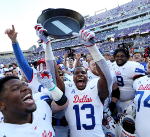By SELENA ROBERTS
Published: September 20, 2006
The N.C.A.A. likes to wrap itself in a letterman’s jacket to protect its image as the bullhorn for college spirit, as a quaint purveyor of lofty values and high ideals.
This town-square logic is policed by a Barney Fife mentality, by a well-intentioned enforcement squad whose tough-guy shtick is often rendered a goofy bluff.
The National Collegiate Athletic Association’s would-be enforcers don’t elicit fear when they don’t possess the subpoena power to compel Reggie Bush to abandon his silence about whether he and his family accepted cash and goodies worth more than $100,000 from marketing agents during his career at the University of Southern California.
“We’re not a Gestapo,†David Price, the N.C.A.A. vice president for enforcement, said in an interview yesterday. “This is a higher-education association.â€
Silk tassels aren’t jibing with reality, though. Division I-A football coaches are commanding C.E.O. money, with more than a dozen in the $2 million club. And there is six-figure sucker pay offered by powerhouses to any small college willing to be embarrassed as a schedule-filler.
Universities are earning millions through the Bowl Championship Series, and booster clubs are supplementing athletic budgets through nonprofit organizations. In 2004, Louisiana State’s Tiger Athletic Foundation paid $840,000 to coaches, according to its tax forms.
Mayberry is a corporate jungle holding to its Happy Valley state of mind.
Trust is the N.C.A.A.’s chief weapon against mischief, even though the truth is in no one’s best interest. Truth could doom bowls and dash television ratings and end careers.
So, with a major enforcement staff of 30 to patrol hundreds of members — from Alabama A&M to Youngstown State — the N.C.A.A. counts on an honor-bar system: a possible infraction is disclosed by the news media, a snitch or an Internet tip, and the university officials scramble to deliver an internal investigation to peel the N.C.A.A. off their backs.
It worked for Ohio State. Will it pay off for U.S.C.?
The two hallowed teams had a lot in common this week. Maurice Clarett delivered Ohio State the 2002 national title in double overtime, but on Monday, he stood with his square shoulders hidden beneath a beige jail-issued shirt, with his sure hands at the goal line now bound by handcuffs.
He revealed the weary eyes of an older man and a vagrant’s beard of someone long lost as he told the court, “I’d like to apologize for my behavior, and I accept the time that was given to me.â€
Bush was free, able to wrap his hands around eight catches as a New Orleans Saints rookie on Sunday. Bush ran fast, with jukes and spins, as if chased by bees on Lambeau Field — or was that a Packer in yellow pants?
“I’m living a dream right now,†Bush said afterward.
Here are two collegiate wonders with disparate afterlives, but Bush and Clarett still have a connection: both have been purposely disowned by university officials.
Maurice? He’s not with us, say the folks at Ohio State.
Reggie? Hardly knew him, say the caretakers of U.S.C.
Deny and disavow. Clarett was discarded well before he was sent to prison on aggravated robbery charges this week. He was a Buckeye outcast the instant he emerged as a player on the take in 2003. After an internal investigation, Ohio State booted Clarett for receiving extra benefits.
The university distanced itself from Clarett and appeased the N.C.A.A. at the same time. The title trophy was safe, all clear.
U.S.C. is expecting a similar outcome. Maybe no punishment at all. No proof, no foul. And even if there was evidence, Bush’s New Orleans teammate Joe Horn summed it up this way, “If he did what they said he did, so what?â€
•
So what isn’t on first or second; so what is the problem.
There are no repercussions. So what if his Heisman Trophy is gone; the memory and the money aren’t. And what about U.S.C.’s fate? Only a few N.C.A.A. penalties rise above symbolic. And those teams that receive harsher punishments — like Miami in the 90’s or Alabama five years ago — show uncanny resilience. Miami emerged from sanctions to reel off 34 straight wins. Alabama finished last season at 10-2.
The N.C.A.A.’s only bullet remains in its chest pocket: the death penalty.
The only time it was dropped on a program — when Southern Methodist University, a serial miscreant, had its 1987 season cancelled — there were catastrophic consequences. Not only did S.M.U.’s athletics collapse, so did its conference.
“There is no penalty in the manual that is off the table if the circumstances and facts warrant it,†said Josephine Potuto, the chairwoman of the N.C.A.A.’s infraction committee.
That’s the way it should be: preserve the cudgel. But how can the N.C.A.A. uncover extreme wrongdoing without subpoena power?
“To get something like that, you end up having to expose yourself to governmental oversight,†Price said. “And that’s something we would have to think long and hard about.
“There are times when we are very frustrated because people won’t talk to us. We have to live with that. And we do the best we can within the system that the N.C.A.A. membership is comfortable with.â€
•
The kinder, gentler N.C.A.A. is more comfortable micromanaging family values. Last week, it gave Clemson permission to establish a trust fund to assistant in normal living expenses for the freshman football player Ray Ray McElrathbey, who has temporary custody of his 11-year-old brother.
The N.C.A.A.’s authority as an enforcer is increasingly futile. Its position as moral authority is all that remains for the keeper of college spirit.
E-mail: [email protected]
NY Times Column: Enforcer Missing from NCAA Rule Book
Moderators: PonyPride, SmooPower
2 posts
• Page 1 of 1
-

MustangStealth 
- Posts: 4093
- Joined: Thu Nov 15, 2001 4:01 am
- Location: Ford Stadium, as often as possible
2 posts
• Page 1 of 1
Who is online
Users browsing this forum: No registered users and 2 guests